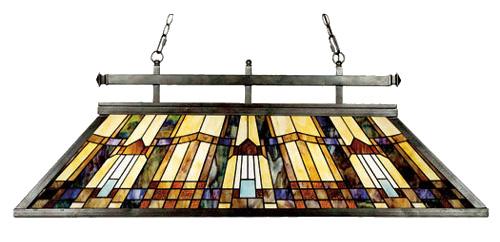
3 minute read
STYLE
billiards tables and accessories
CALIFORNIA HOUSE CITY POOL TABLE $6,798 at Master Z’s, Brookfield The City Pool Table is an original California House design. It features a 100% solid kiln-dried hardwood frame and base, factory pre-assembled chassis that’s precision leveled, and integrated rail and apron unit for supreme strength.
MCDERMOTT H1751 CUE OF THE YEAR
$1,799 at McDermott Cue Mfg. LLC, Menomonee Falls McDermott produces a Cue of the Year annually to show off its abilities. The H1751 has inlays of green malachite, snakewood, mother of pearl, pewter and black urethane. Production is limited to 100, and each cue is hand numbered.
MCDERMOTT H2451 CUE OF THE YEAR ENHANCED $2,499 at McDermott Cue Mfg. LLC, Menomonee Falls The H2451 replaces the H1751’s green malachite with shimmering Abalone. Production is limited to only 50, and each cue is hand numbered.


THREE LIGHT ISLAND CHANDELIER $799.95 at BBC Lighting, Milwaukee From manufacturer Quoizel, a classic geometric Arts and Crafts piece with handcrafted art glass in shades of sapphire blue, warm honey amber and cream.
Dave Spano President & CEO Annex Wealth Management
Web: annexwealth.com
Contact: (262) 786-6363
Markets tend to overreact to virus news History shows markets typically rebound from pandemic fears by Dave Spano
It seems like everywhere I’ve been the past few days – from my son’s basketball game to the television and radio news outlets who have approached me – people want to talk about coronavirus and the recent market correction.

Market questions are part of everyday life when you’re running a wealth management firm. For me, it helps to have decades of experience and my CFP™ certification, along with the shared insights of the investment professionals on my team.
I can assure you: an understanding of epidemiology is typically not necessary when helping people plan their retirement future. I’m not preparing to add “Virus Services” to Annex’s comprehensive wealth management offering.
But decades of watching the markets have given me a deeper understanding of how virus and pandemic fears affect economies and headlines. And while the impact on human lives by coronavirus (COVID-19) has been tragic, there’s plenty of historical data that shows the virus’s effect will likely be short-lived.
A quick scan of virus events over the past twenty years shows that while the markets may have been affected in the short term, the longer-term result is often a rebound. A few examples:
• The Pneumonic Plague event of September 1994 saw a six-month change in the S&P 500 of about +8%; the 12-month change was +25%. 1
• The SARS Scare in April of 2003 saw a six-month change in the S&P 500 of over +14%; the 12-month change was +20%.
• MERS fears from May of 2013 saw a six-month change of over +10%; the 12-month change was about +18%.
The list of scares goes far beyond these three examples, and while there are some variances (like the Measles scare of December 2014, which saw the 12-month change -.7%), largely, the rebound from the scare was often positive, and often larger than the six-month change.
As you can expect me to say, past performance is not indicative of future returns. But we do believe it’s helpful to gain perspective and see how markets have reacted and subsequently recovered during prior epidemics. Of course, there’s no way to know if this time will be different.
We’ve spent the last few days in communication with our clients, whether on the phone or through video segments we’ve sent out to let them know where we stand. While we currently see the U.S. economy on good footing, no one can account for the timing or breadth of a “black swan” event like coronavirus.
Still, we can look at history and consider that all the other virus scares we’ve seen over the past decade have subsided, and that virus-related drag on corporate earnings or economic activity will likely end. Breathe. Wash your hands. Protect your health. Don’t panic with your investment portfolio.









